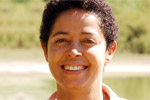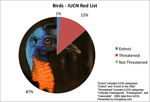In a short interview with New Scientist, world renowned entomologist, conservationist, and author, E.O. Wilson speaks about his latest idea to save the world’s biodiversity.
“If you save the living environment, you will automatically save the physical environment. But if you only try to save the physical environment, you will lose them both,” Wilson says, adding that so far environmentalists have focused too much on the ‘physical environment’. “When we talk about the world going green, the media and the public think of pollution or fresh-water shortage. They understand, and want to do something. But that is the physical world; concern for the living environment has been slow to take off.”
His solution: a new agency “along the lines of the Intergovernmental Panel on Climate Change (IPCC),” but which will deal directly with stemming the biodiversity loss. The IPCC “has had huge success marshalling global science to address climate change, providing models and the evidence to show climate change is happening, and that it is due to human activity. But it is still all about the physical world.”
Wilson argues that the ‘living world’ has been largely left behind when it comes to environmentalism. “We are not making the headway we should be in preventing the destruction of ecosystems and species. I have written book after book arguing that if we don’t start caring about holding onto them, we will have big problems – some unforeseeable,” Wilson says, going on the explain that “people see nature as trees, plants and vertebrates. Yet the world is run by little creatures most people have not heard of; 99 per cent of Earth’s organisms are extremely small. For example, some of the most abundant and crucial land animals are the tiny oribatid mites, which are the size of a pinhead and look like a cross between a turtle and a spider. They are a linchpin organism of the environment, but 20 years ago when I set out to identify them no one had heard of them. Back then there were just two people in the US able to identify them. Fortunately one agreed to work with me. Yet we still don’t know what the vast majority of oribatids do.”
Related articles

(08/17/2009) Founded in 2004 by legendary conservationist Richard Leakey, WildlifeDirect is an innovative member of the conservation community. WildlifeDirect is really a meta-organization: it gathers together hundreds of conservation initiatives who blog regularly about the trials and joys of practicing on-the-ground conservation. From stories of gorillas reintroduced in the wild to tracking elephants in the Okavango Delta to saving sea turtles in Sumatra, WildlifeDirect provides the unique experience of actually hearing directly from scientists and conservationists worldwide.
REDD shouldn’t neglect biodiversity say scientists
(07/30/2009) Schemes to mitigate climate change by protecting tropical forests must take into account biodiversity conservation, said two leading scientific organizations at the conclusion of a four day meeting in Marburg, Germany.
869 species extinct, 17,000 threatened with extinction

(07/02/2009) Nearly 17,000 plant and animal species are known to be threatened with extinction, while more than 800 have disappeared over the past 500 years, reports the International Union for Conservation of Nature (IUCN). While these numbers are substantial, they are likely “gross” underestimates since only 2.7 percent of 1.8 million described species have been assessed. The IUCN report warns that governments will miss their 2010 target for reducing biodiversity loss.














